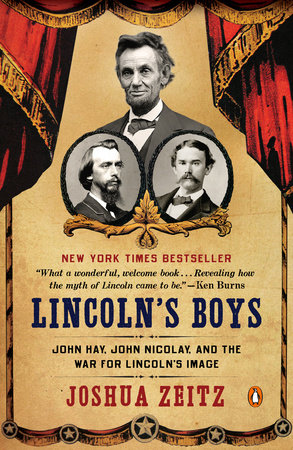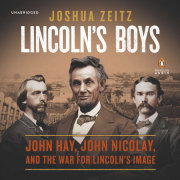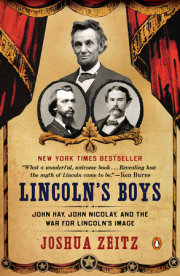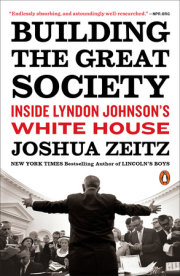Prologue
June 13, 1905
Less than three weeks before his death, John Milton Hay awoke in his cabin room on the RMS
Baltic as the great ocean liner, still the jewel of the White Star Line, steamed a course from Liverpool to New York. He reached for his diary and composed one of its final entries.
It was June 1905. Electric lights and streetcars lined hundreds of American towns. Phonographs and telephones were quickly becom- ing common fixtures in middle-class living rooms, and for a nickel city folk could gaze into large wood and steel boxes and marvel at moving picture images of prizefighters, ballplayers, and ballerinas. John D. Rockefeller and Andrew Carnegie represented the extremes of Amer- ican wealth and power. It had already been two years since the Wright brothers conducted the first manned test flight of an airplane. In Ger- many, the theoretical physicist Albert Einstein had recently published a paper on the “photoelectric effect” and was fast at work developing his theory of relativity. In Vienna, Sigmund Freud published his path- breaking volume
Three Essays on the Theory of Sexuality.In his youth, John Hay could scarcely have imagined this world. A child of the western prairie, he was raised in the age of iron and grew to manhood in the age of steel. A noted poet and historian, former newspaper editor and railroad executive, Hay had served as U.S.
ambassador to Britain and, since 1898, secretary of state—first under President William McK inley and then, after 1901, under President Theodore Roosevelt. He was one of the most powerful men in the world. But his bright spirit was fast burning out a frail body. In his final weeks, his mind wandered back to the simpler world of his youth.
“I dreamed last night that I was in Washington,” Hay confided to his diary, “and that I went to the White House to report to the President, who turned out to be Mr. Lincoln. He was very k ind and considerate, and sympathetic about my illness. He gave me two unimportant letters to answer. I was pleased that this slight order was within my power to obey. I was not in the least surprised at Lincoln’s presence in the White House. But the whole impression of the dream was one of overpowering melancholy.”
This is the story of John Hay and John Nicolay, prairie boys who met in
1851 and forged a close friendship that endured over a half century. For- tune placed them in the right place (Springfield, Illinois) at the right time (1860) and offered them a front-row seat to one of the most tumultuous political and military upheavals in American history, then or since.
As Abraham Lincoln’s private secretaries, they became, both liter- ally and figuratively, closer to the president than anyone outside his immediate family. Still young men in their twenties, they lived and worked on the second floor of the White House, performing the roles and functions of a modern-day chief of staff, press secretary, political director, and presidential body man. Above all, they guarded the “last door which opens into the awful presence” of the commander in chief, in the words of Noah Brooks, a journalist and one of many Washing- ton insiders who coveted their jobs, resented their influence, and thought them a little too big for their britches (“a fault for which it seems to me either Nature or our tailors are to blame,” Hay once quipped). “These . . . Secretaries are young men,” Brooks grumbled, “and the least said of them the better, perhaps.”
In demeanor and temperament, they could not have been more different. Short-tempered and dyspeptic, Nicolay cut a brooding figure to those seeking the president’s time or favor. William Stoddard, an
assistant secretary under their supervision, later remarked that Nicolay was “decidedly German in his manner of telling men what he thought of them . . . People who do not like him—because they can- not use him, perhaps—say he is sour and crusty, and it is a grand good thing, then, that he is.”
Hay cultivated a softer image. He was, in the words of his contemporaries, a “comely young man with peach-blossom face,” “very witty—boyish in his manner, yet deep enough— bubbling over with some brilliant speech.” An instant fixture in Washington social circles, fast friend of Robert Todd Lincoln’s, and favorite among Republican congressmen who haunted the White House halls, he projected a youthful dash that balanced out Nicolay’s more grim bearing.
Hay and Nicolay were party to the president’s greatest official acts and most private moments. They were in the room when he signed the Emancipation Proclamation, and they were by his side at Gettysburg, when he first spoke to the nation of a “new birth of freedom.” When he could not sleep, which, as the war progressed, was often, Lincoln walked down the corridor to their private quarters and passed the time reciting Shakespeare or mulling over the day’s political and military developments. When his son Willie passed away in 1862, the first per- son to whom Lincoln turned was John Nicolay. When the president drew his last breath in April 1865, John Hay was by his bedside.
For the rest of their lives, even as they built their own families and careers, Hay and Nicolay inspired a certain measure of wonder and awe. The greater Lincoln grew in death, the greater they grew for having known him so well, and so intimately, in life. Everyone wanted to know them, if only to ask what it had been like—what
he had been like. It was a tough question to answer. Abraham Lincoln worked hard at being inscrutable. “The tones, the gestures, the kindling eye, and the mirth-provoking look defy the reporter’s skill,” wrote Brooks. William Herndon, Lincoln’s law partner, could fairly claim to have known him as well as any man during the Springfield days. But to Herndon, the future president was the most “shut-mouthed man who ever lived.” He “always told only enough of his plans and purpose to induce the belief that he had communicated all,” observed another friend, “yet he
reserved enough to have communicated nothing.” Even Lincoln acknowledged as much. “I am rather inclined to silence,” he admitted, “and whether that be wise or not, it is at least more unusual now-a-days to find a man who can hold his tongue than to find one who cannot.” If anyone knew the inner mind of the president, it was the two secretaries. Witty and prolific letter writers, observant and incisive diarists, Hay and Nicolay left a remarkable record of Lincoln’s evolution as chief executive. By their later account, they “came from Illinois to Washington with him, and remained at his side and in his service— separately or together—until the day of his death. We were the daily and nightly witnesses of the incidents, the anxieties, the fears, and the hopes which pervaded the Executive Mansion and the National Capital during the war.” Better than anyone else, they knew where the president was, what he was doing, and what he was thinking at almost every turn. It is little wonder that historians of the era consult Hay’s and Nicolay’s writings freely and frequently. But their life’s work after
the Civil War is a largely forgotten story.
“The boys,” as the president affectionately called them, became Lincoln’s official biographers. Enjoying exclusive access to his papers, which the Lincoln family closed to the public until 1947, they under- took a twenty-five-year mission to create a definitive and enduring historical image of their slain leader. It became the great undertaking of their lives. The culmination of these efforts—their exhaustive, ten- volume biography, which was widely serialized between 1886 and
1890—constituted one of the most successful exercises in historical revisionism in American history. Writing against the rising currents of Southern apologia and a popular vogue for reunion and reconciliation, Hay and Nicolay pioneered the “Northern” interpretation of the Civil War—an interpretation whose influence waxed and waned but that created a standard against which every other historian and polemicist had to stake out his or her position.
Hay and Nicolay helped invent the Lincoln we know today:
the Great Emancipator the sage father figure
the military genius
the greatest American orator the brilliant political tactician
the master of a fractious cabinet who forged a “team of rivals” out of erstwhile challengers for the throne
the Lincoln Memorial Lincoln
That Abraham Lincoln was all of these things, in some measure, there can be no doubt. But it is easy to forget how widely underrated Lincoln the president and Lincoln the man were on the eve of his death and how successful Hay and Nicolay were in elevating his place in the nation’s collective historical memory. While Lincoln prided himself on his deep connection to “the people”—that nebulous body politic in whose collective wisdom he developed an almost mystic faith—he never succeeded in translating his immense popularity with the Northern public into similar regard among the nation’s political and intellectual elites. The profound emotional bond that he shared with Union soldiers and their families, and his stunning electoral suc- cess in two successive presidential elections, never fully inspired an equivalent level of esteem by the influential men who governed the country and guarded its official history. To many of these men, he re- mained in death what he was in life: the rail-splitter and country lawyer—good, decent, and ill-fitted to the immense responsibilities that befell him in time of war.
Leading into the 1864 election cycle, many prominent members of Lincoln’s own party agreed with the Iowa senator James Grimes that the administration “has been a disgrace from the very beginning to every one who had any thing to do with bringing it into power.” Charles Sumner, the radical antislavery leader, fumed that the nation needed “a president with brains; one who can make a plan and carry it out.” From across the political spectrum, influential writers and politicians blamed Lincoln for four years of military stalemate and setbacks and for a series of political blunders that cost his party dearly in the 1862 midterm elections. John Andrew, the governor of Massa- chusetts, spoke for many Republicans when he explained his support of Lincoln’s reelection. The president, he said, was “essentially lacking in the quality of leadership,” but now that he had been renominated, “correction is impossible . . . Massachusetts will vote for the Union Cause at all events and will support Mr. Lincoln so long as he remains the candidate.”
Years later, Hay remarked that had Lincoln “died in the days of doubt and gloom which preceded his reelection,” rather than in the final weeks of the war, as the Union moved to secure its great victory, he would almost certainly have been remembered differently, despite his great acts and deeds.
But that is not how it happened. Assassinated on Good Friday, Lincoln became a Christ figure to many Americans who sought to make sense of the carnival of death and destruction that had touched virtually every community over the preceding four years. But apotheosis was not Hay’s or Nicolay’s objective. They sought to canonize their boss as a great leader among men, not a saint or a martyr. They re- membered him as an innate leader of men, with a powerful grasp of political and military strategy. He was steadfast where other men wavered; he saw the long game, where others staggered from crisis to crisis; he alone enjoyed the trust of the Northern people. Americans today understand Abraham Lincoln much as Nicolay and Hay hoped that they would. Theirs was a deliberate project of historical creation. They were “Lincoln men,” Hay asserted, and they meant to tell their story so that the rest of the world would know the man as they had.
It was not an easy task to complete. Hay and Nicolay had to slug it out with lesser figures who entertained their own ideas about Lincoln’s place in history. They were especially troubled by the historical amnesia that was quickly taking hold over the reunited states. In popular literature and journalism, the war was being recast as a brothers’ squabble over abstract political principles like federalism and states’ rights, rather than as a moral struggle between slavery and freedom. Magazines and newspapers commonly took to celebrating the military valor of both Confederate and Union soldiers, as though bravery, rather than morality, were the chief quality to be commemorated.
They also reimagined Lincoln as a conciliatory figure who was above politics and sectionalism, conveniently forgetting the social revolution unleashed by emancipation and ignoring his admonition—just weeks before his death—that “if God wills that [the war] continue until all the wealth piled by the bondsman’s two hundred and fifty years of unrequited toil shall be sunk, and until every drop of blood drawn with the lash shall be paid by another drawn with the sword, as was said three thousand years ago, so still it must be said ‘the judgments of the Lord are true and righteous altogether.’ ”
Nicolay and Hay viewed this revisionist tendency with alarm. While their editor and publisher hoped that the Nicolay-Hay volumes would “help unite the North and South as never before, around the story and experiences of the great President,” the authors pointedly rejected the vogue for sectional reconciliation and emphasized the salient moral and political issues that divided the two sections before, and in many respects after, the war. The war had been caused by “an uprising of the national conscience against a secular wrong” that could never be blotted out by the romance of reunion. Though the influence of their interpretation of events would wax and wane over time, it established the terms of a historiographical debate that persists to this day. As the only authorized biographers of Abraham Lincoln, they played a central role in determining how future generations would understand and imagine the sixteenth president and the events over which he presided.
More than just a story of history and memory, this book also addresses the ideological journey traveled by many men who came of age during the Civil War. Jolted to consciousness by the national debate over slavery, they were America’s first “hope and change” generation. They forged new and expansive ideas about national citizenship on the fields of Shiloh and Gettysburg and in the halls of Congress. Yet in the de- cades that followed the war, many young men who began public life as antislavery crusaders seemed to be evolving into relatively conservative adults.
In some respects, there was great consistency in this evolution. The
Republican Party, an organization that would remain central to the political identities of men like Hay and Nicolay, was founded on the laissez-faire proposition that free labor is always superior to slave la- bor. Regardless of color, people should be afforded the right to rise or fall on their talents and industry. Most Republicans continued to embrace this free-market understanding of the world, but by the 1870s that vision had grown estranged from its radical antislavery roots and become a natural point of opposition to labor unions and advocates of urban and working-class Americans. During the war, Republicans had forged a strong alliance with capital and industry to subdue the South. After the war, they saw no reason to divorce the party from its interests. Many men like Hay and Nicolay, who cut their teeth on antislavery politics, were comfortable with the inequalities that modern capitalism wrought. In their youth, they were reformers; as they grew old, they became conservatives. It was not their thinking that changed as much as the context.
A brief note about what this book is not—namely, a comprehensive biography of John Hay or John Nicolay, let alone Abraham Lincoln. Much has been written about Hay’s literary career, his friendship with Henry Adams, and his service as secretary of state under McK inley and Roosevelt. In many ways, he was one of the most extraordinary men of his generation. He was seemingly everywhere at every turn. I touch on these topics insofar as they help to inform a discussion of his ideological progression and his enduring allegiance to a martyred president, but this is not a work of diplomatic or literary history. Little has been written about Nicolay’s postwar career, as so much of it was devoted to preserving the memory of Lincoln. These pages fill in some of the gaps in his story.
Nicolay and Hay believed that writing good history required telling a good story. Ours begins some fifty years before John Hay’s final pas- sage across the sea, in Providence, Rhode Island, where a young poet has just completed a long journey from his boyhood home in Illinois.
Copyright © 2014 by Joshua Zeitz. All rights reserved. No part of this excerpt may be reproduced or reprinted without permission in writing from the publisher.











